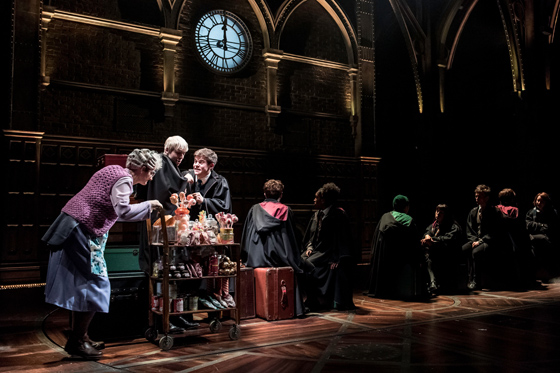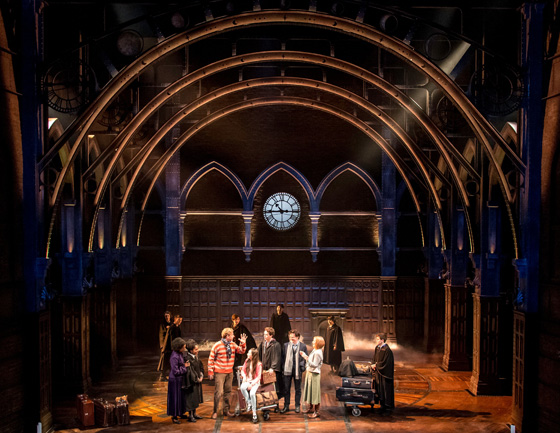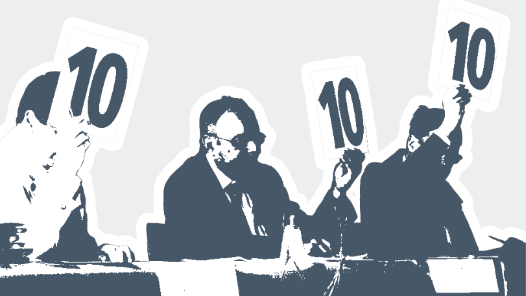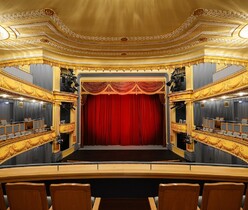Harry Potter And The Cursed Child - Harry Potter Opening Night at the Palace Theatre London
Be nice, be kind
von Andrew Haydon
London, 28th/29th July 2016. "Harry Potter and the Cursed Child" up-ends all good critical practice. Ordinarily, one would offer an outline of the plot, the staging, and the dramaturgy, and would be able to back-up the assertions with examples. For "Harry Potter..." there seems to be a requirement for secrecy, above and beyond the usual not giving away key plot twists requirement; outside the theatre, the Daily Telegraph review is hung – as if as an example to other critics – with chunks of its text redacted under #KeepTheSecrets tape, like a prematurely released MI6 document containing material that may still threaten national security.
It's so intensely irritating, that if there weren't children involved, you’d be tempted to write down every single major plot point immediately. Instead, one can only make vague, groundless assertions. The first of these is that Harry Potter and the Cursed Child succeeds superlatively in being what it sets out to be. The story is by JK Rowling, writer Jack Thorne, and director John Tiffany, and while it would be fruitless to speculate as to whose impulses are which, the overall narrative feels satisfyingly authentic / canonical.
Harry Potter has a son
I think critics are allowed to share the basics. We all know it's set directly after the epilogue to the seventh book. Harry Potter and Lily Weasley have a son, Albus Severus Potter, and Darco Malfoy (now inexplicably a gruff cockney) has a son called Scorpius. Who are going up to Hogwarts. I think it's also ok to say that the play dispenses with the first three years of their time at school together in all of ten or fifteen minutes of fast-paced, montage-like scenes.
 L. R. Sandy McDade (Trolley Witch), Anthony Boyle (Scorpius Malfoy), Sam Clemmett (Albus Potter)
L. R. Sandy McDade (Trolley Witch), Anthony Boyle (Scorpius Malfoy), Sam Clemmett (Albus Potter)
and the cast of Harry Potter and the Cursed Child Harry Potter © Manuel Harlan
Quickly the themes of the two parts are put in place: inter-generational conflict, living under the shadow of famous and / or infamous parents, close male friendship against parents' wishes, etc.; staples of teen drama, and the emotional motor here. Thorne's signature fondness for gawky teens with excellent one-liners is eminently noticeable here, in amongst Rowling's equally familiar, strong, uncomplicated, easy-to-agree-with moral messages: be nice, be kind, being nice and being kind aren't always easy, good people sometimes say naughty things; having "a good heart" is a thing, etc.
Feels like it should
Ghastly as it all sounds in the cold light of day, it actually feels precisely how it should when you're watching it. And moreover, there’s also the satisfyingly eventful plot driving the two evenings’ entertainment. Indeed, so much happens in HPATCC that critics should be grateful for the embargo forbidding disclosure. Frankly, even trying to explain the bare bones would require a short pamphlet, but instead of an outline, please accept my assurances that A Lot Happens, and if you like the books / films, then you’ll be very happy with the profusion of Stuff Happening in this one too. Indeed, perhaps the neatest trick the two plays play is feeling at once like a 600-page novel that's been impossibly crammed into four hours twenty minutes of stage-time and a virtuoso impressionist staging of what the film of that book would have been like.
 Victorian architecture: "Harry Potter" stage scene at the Palace Theatre London
Victorian architecture: "Harry Potter" stage scene at the Palace Theatre London
© Manuel Harlan
It's actually incredibly clever. It feels, at once, exactly like theatre, and at the same time, is nothing remotely like most theatre that exists at all. There are also more special effects in these two pieces than I've seen in almost twenty years of reviewing, and generally speaking, they’re rather impressive; effective, likeable, and occasionally genuinely mystifying (illusions and magic: Jamie Harrison). Equally, there's a lot of time where the audience is required to imagine away something very standard and stagey, but, if anything, that's even nicer. It's something we see a lot of in Britain, and so it's as well to start getting these massive potential new audiences used to it, in preparation for the doubtless vast number of other plays they're all going to go and see now that they've all immediately become theatre addicts (so the optimistic thinking goes).
Industrial Revolution-Era
In terms of performances, Jamie Parker (grown-up Harry Potter) and Anthony Boyle (Scorpius Malfoy) steal the show, though perhaps on the unfair grounds that they have the most complex emotional journeys by some considerable margin. Visually (set designer: Christine Jones, lighting design: Neil Austin, video design: Finn Ross and Ash Woodward), the stark, austere gloom of industrial revolution-era iron arches evoke everything from Kings Cross / St Pancras, to Hogwarts' interiors and exteriors and beyond, with just enough light and colour to keep younger fans happy.
Overall, quibbling about this or that thing is churlish, though. This is a lovely way of spending two evenings (although I dare say the cumulative force of seeing both parts in a single day would be infinitely more satisfying – and the combined length is still shorter than most work by Frank Castorf, after all), even if the main impact is in-the-moment sentimentality, and oohs and aahs, rather than lasting emotional or intellectual resonance. But, judging by the terrible state that Brexit Britain is in at the moment, maybe an incredibly popular play telling us all just to try being a bit nicer is all the complexity required right now.
Harry Potter And The Cursed Child
Original story by J. K. Rowling, Jack Thorne and John Tiffany
Director: John Tiffany, Writer: Jack Thorne, Set: Christine Jones, Costume: Katrina Lindsay, Music: Imogen Heap, Lighting: Neil Austin, Sound: Gareth Fry, Special Effects: Jeremy Chernick, Illusions and magic: Jamie Harrison, Music supervisor: Martin Lowe, Movement: Steven Hoggett, Producers: Colin Callender and Sonia Friedman Productions.
Cast: Nicola Alexis, Helen Aluko, Jeremy Ang Jones, Rosemary Annabella, Annabel Baldwin, Jack Bennett, Paul Bentall, Anthony Boyle, Sam Clemmett, Morag Cross, Noma Dumezweni, Claudia Grant, James Howard, Lowri James, Chris Jarman, Martin Johnston, Chipo Kureya, James Le Lacheur, Helena Lymbery, Barry McCarthy, Sandy McDade, Andrew McDonald, Tom Mackley, Adam McNamara, Poppy Miller, Tom Milligan, Jack North, Jamie Parker, Alex Price, Stuart Ramsay, Nuno Silva, Cherrelle Skeete, Esther Smith, Paul Thornley, Joshua Wyatt.
Duration Part One: 2 hours 40 minutes, one interval
Duration Part Two: 2 hours 35 minutes, one interval
www.palacetheatrelondon.org
Man hätte das Stück auch "Väter und Söhne" nennen können, findet Gina Thomas in der Frankfurter Allgemeinen Zeitung (26.7.2016). "Die komplizierte Handlung dreht sich nach Abschälen der Thriller- und Zauberelemente, die sich um das Ansinnen von Albus und Skorpius ranken, ein Unrecht aus der Vergangenheit zurechtzubiegen, im Wesentlichen um die Beziehung zwischen Eltern und Kindern." Allerdings beeindruckten die straffe Regie John Tiffanys und die schauspielerischen Leistungen mehr als die breitgetretene Handlung.
"Above all", schreibt Sarah Hemming in der Financial Times aus London (26.7.2016), the performance "succeeds because the team has put transformation right at the heart of the story, both structurally and emotionally. It’s a move that allows the drama to play to drama’s strengths — this is, after all, an art form that depends on an actor transfiguring before your eyes into someone else. And, amid all the epic fantasy, it homes in on the magic we all have at our fingertips: the ability to make a difference to another person."
"If I’m honest, I got as much pleasure from the staging as from the convoluted story", berichtet Michael Billington im Guardian (26.7.2016). "Tiffany and his designer, Christine Jones, have created magic out of the simplest ingredients." Auch er lobt die Schauspieler: "Any danger that the effects would upstage the actors is overcome by a set of strong performances."
Für Horizonterweiterung
Der Blick über den eigenen Tellerrand hinaus ist uns wichtig. Wir möchten auch in Zukunft über relevante Entwicklungen und Ereignisse in anderen Ländern schreiben. Unterstützen Sie unsere internationale Theaterberichterstattung.
meldungen >
- 10. Mai 2024 Berlin: Produktionsmanagerin Christine Elbel verstorben
- 10. Mai 2024 Mainz: Europäisches Arbeitsstipendium vergeben
- 10. Mai 2024 Deutscher Amateurtheaterpreis "Amarena" vergeben
- 09. Mai 2024 Oberammergau: Stückl-Uraufführung abgesagt
- 08. Mai 2024 Intendantin Annemie Vanackere verlängert am Berliner HAU
- 06. Mai 2024 Bochum: Sabine Reich leitet ab 2025 das Prinz-Regent-Theater
- 06. Mai 2024 Wiener Festwochen: Kritik an Rede an Europa
- 05. Mai 2024 Heidelberger Stückemarkt: Autor*innenpreis 2024 vergeben








neueste kommentare >